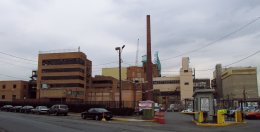
(December 2002)
For the past seventeen months, the application for the 1.4 million square foot Maxwell House development project, has followed a tortured path through the Hoboken Planning Board hearing process. Attorney James Segreto, representing objectors to this project, has effectively prolonged this application through 21 hearings by relentlessly cross-examining witnesses. There has been a competing proposal for this site from Stevens Institute of Technology supported by the Mayor and a number of civic leaders. A number of Planning Board members have raised objections to the project’s scale. Hoboken residents attending the hearings have repeatedly asked questions of the traffic, planning and architectural experts.
This week, however, the developers experienced a dramatic reversal of fortune. On December 11th, opposition attorney, James Segreto, announced his withdrawal from this case. The next evening at the Planning Board meeting, the Board’s planner and engineer firmly voiced their opinions that the project conformed to the Hoboken zoning ordinance, therefore requiring no variances. Planning Board attorney Michael Pane cited what he considered a relevant case, Dunkin’ Donuts of New Jersey vs. the Township of North Brunswick. In this case, the Appellate Division of Superior Court ruled that the Planning Board was wrong to reject an application because of off-site traffic conditions. Several months ago, it became clear that Stevens Institute’s proposal for this site had fallen apart.
At the end of the December 12th hearing, the Board’s planning consultant, Eileen Banyra, outlined a potential resolution to this yearlong conflict. That afternoon Ms. Banyra and a planner representing the developers spent five hours hammering out the details of a potential settlement that the Planning Board could be asked to approve at their December 23rd meeting. The number of residential units would be reduced by 150, resulting in 832 total units. An additional acre of open space would be created by eliminating the 18-foot high portion of the project directly in front of Elysian Park. A number of the excess parking spaces would be eliminated. The developers have also agreed to redesign the five-acre public park at the waterfront to a higher standard. This park, originally conceived as a land conservation transaction, was included in the August 2001 application.
At its November meeting, the Planning Board voted to send a subpoena to Kings Supermarket which attorney James Segreto named as his client. The purpose of the subpoena was to determine the real parties in interest behind the objectors’ case. One of the developers, Daniel Gans, stated that Segreto’s withdrawal was most likely prompted by the subpoena and that the persons funding this legal battle did not want to risk being identified.
In the past several months, a number of alternate proposals for Maxwell House have been explored by City consultants. One proposal was an ordinance change increasing the amount of commercial space and decreasing the residential. Another proposal was to shift the project into several twenty-story towers, thereby preserving the area south of Eleventh Street as open space. This same proposal also included the option of preserving the Maxwell House factory building on Twelfth and Hudson Streets. Another idea was to declare the site a redevelopment area and grant the developers a tax abatement in exchange for lower density. Most of these proposals do not appear to have gotten far except for the redevelopment plan idea that will be considered in a hearing before the Planning Board on December 23.
The Fund for a Better Waterfront (FBW) has worked since March of 2000, to secure the land and piers east of Sinatra Drive North for a five-acre park. In the spring of 2001, FBW assembled a team of experts, including a land conservation specialist, planner, landscape architect, marine engineer and several attorneys, to work with the developers. By the end of that year, several detailed agreements were nearly finalized. The developers were to donate the five acres of waterfront property to a land conservation organization to be used in perpetuity as a public park. FBW created a landscape plan for this park and the developers agreed to build the park to that standard at their own expense, an estimated $9.5 million. The 982 residential units and 200,000 square feet of commercial space would be assessed annually to pay for the maintenance of the park. But a year ago, as controversy over the project arose, the developers refused to finalize these agreements with FBW.
The settlement described at the last Planning Board meeting was offered up by the developers under the condition that it be approved before the end of the year. The vote on preliminary site plan approval for the Maxwell House project could take place at the December 23 Planning Board meeting. If that occurs, the donation of the waterfront park would be included in that approval. Then there would be an opportunity to work out the details of a land conservation agreement before the final Planning Board resolution is adopted.
FBW News Archive

